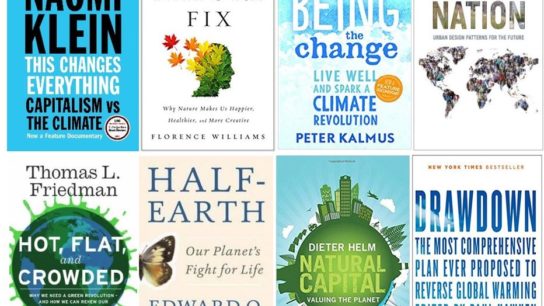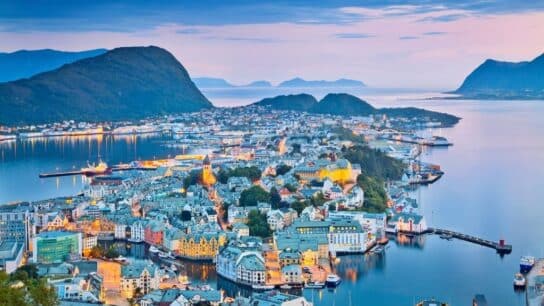The global demand for fashion and cheap clothing has risen at an unprecedented rate that the fashion industry now accounts for 10% of global carbon emissions while contributing to nearly 20% of global wastewater. What’s more, the world at large generates an estimated 92 million tonnes of textiles waste every year, which is expected to soar up to 134 million tonnes a year by 2030. But how did we get to this point? Environmentalists and filmmakers have shed light on the terrible working conditions in developing countries in order for people to enjoy cheap clothing, driving our reckless consumption habits. These are some of the best fast fashion documentaries illustrating the environmental and social impacts of the fast fashion industry, as well as solutions in breaking the cycle.
—
Must-See Fast Fashion Documentaries
RiverBlue (2017)
Canadian conservationist, professor and paddler Mark Angelo embarks on an unprecedented three-year river journey around the world. What he ends up unveiling during his expedition is the shocking damage and pollution of the global fashion industry has done to our rivers and water sources. In this revelatory documentary, discover shocking statistics including how we consume 2,700 litres of water to produce one cotton shirt – which is enough to sustain a human being for almost three years – and how we’re contributing monumental amounts of wastewater from fabric dyeing and treatment. Narrated by clean water supporter Jason Priestley, RiverBlue sheds light not only on the toxic materials that get dumped in our waterways, but offers solutions to reevaluate our consumption practices to ensure a sustainable future, making it one of the best fast fashion documentaries to watch.
Made In Bangladesh (2019)
The hero of this documentary is Shimu, a 23-year-old textile worker who fights for fair labour rights following the death of a co-worker at the factory that she works at in Bangladesh. See her contentious struggles against management and disapproval of her husband, and her unwavering will to fight for her fellow female workers to ensure safe working conditions. Made in Bangladesh is an earnest portrait of social rebellion and a powerful feminist statement to boot, and it should be on everyone’s must-watch list of fast fashion documentaries.

The True Cost (2015)
If you only watch a film about fast fashion, make it this one. The True Cost pulls back the curtain on how we truly pay the price for our clothing, especially as fashion is produced more rapidly and in massive, wasteful quantities. The groundbreaking fast fashion documentary covers everything from the environmental costs and impacts of our current global fashion industry, the labour rights abuses in developing countries, as well as delving into how genetically modified cotton is related to cancer incidence and suicide. Interspersed with interviews from the world’s leading voices including Stella McCartney, Livia Firth and Vandana Shiva, the film will force viewers to look at their clothes and habits in a whole new perspective.
You might also like: 7 Fast Fashion Companies Responsible for Environmental Pollution
The Machinists (2010)
This British documentary follows the daily lives of three female workers who make clothes for popular high street brands like Primark, H&M and Zara in the garment factories of Dhaka, Bangladesh, as well as the boss of a trade union to illustrate how the fashion industry makes huge profits at the expense of their workers. Directors Hannan Majid and Richard York provide a deeply personal account of the workers’ stories and the uphill battles in which they face to improve their working conditions and fair wages.
Udita (2015)
A semi follow-up to The Machinist, Udita focuses on the lives of the women at the centre of a grassroots movement in the garment industry. Over the course of five years, these inspiring women have braved through beatings, sacking, arrests, and the 2013 Dhaka garment factory collapse – which caused the death of 1,134 workers to experience the protection that they enjoy today. Experience the long fight through the eyes of the unions’ female members, workers, and leaders as the film calls for the end of exploitation of garment workers around the world.
The Next Black (2014)
Is green the new black? That is the question this documentary attempts to answer as it explores innovative solutions and technologies that will likely reshape the future of fashion. The Next Black dives into the world of sustainable fashion and ways in which we can make it more accessible, as well as championing leaders of the “slow fashion” movement. The film is also packed with interviews with designers and innovators sharing their passion for fashion and the environment, providing a fresh, and in many ways, hopeful snapshot of our fashion industry.
Unravel (2012)
UK-based filmmaker Meghna Gupta takes audiences on a journey from Western and developed countries to India’s industrial interiors, unravelling in the process just how our discarded clothes get recycled and repurposed into yarn. This 14-minute short film puts a spotlight on a recycling facility in India where clothing and goods from the fast fashion industry end up, and reveals the unique perspectives and opinions of workers on why so much clothes get thrown out by the West – spoiler alert, they think there’s a water shortage. Seeing the situation through their eyes forces us to realise how recklessly we treat our garments and how wasteful the industry as a whole has become.
You might also like: 6 Must-See Documentaries About Food Waste
Featured image by: Made in Bangladesh


















